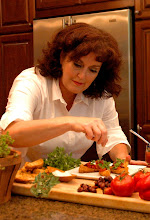Sweet Porridge
Jacob and Wilhelm Grimm
There was a poor but pious little girl who lived alone with her mother, and they no longer had anything to eat. So the child went into the forest, and there an old woman met her. She knew of the girl's sorrow, and presented her with a little pot, which when she said, "Little pot, cook," would cook good, sweet millet porridge, and when she said, " Little pot, stop," it stopped cooking .
The girl took the pot home to her mother, and now they were freed from their poverty and hunger, and ate sweet porridge as often as they chose. One time when the girl had gone out, her mother said, "Little pot, cook." And it did cook, and she ate until she was full, and then she wanted the pot to stop cooking , but did not know the word. So it went on cooking and the porridge rose over the edge, and still it cooked on until the kitchen and whole house were full, and then the next house, and then the whole street, just as if it wanted to satisfy the hunger of the whole world. It was terrible, and no one knew how to stop it. At last when only one single house remained, the child came home and just said, "Little pot, stop," and it stopped cooking , and anyone who wished to return to the town had to eat his way back. **
So, care to make some porridge of your own? Ancient Scots would use a spurtle, which is the antiquated take on a wooden spoon. Long, cylindrical and often decoratively carved, with a slightly pointed end, the wooden spurtle would help cooks stir the oats to keep them smooth.
Here's the perfect classic recipe, which has changed precious little for centuries:
Sweet Porridge
Ingredients:
250 ml water or milk
50 grams oats (Scots and Irish use steel-cut or pinhead oats)
pinch of salt
cinnamon to taste
1. In medium saucepan, combine ingredients and bring to a boil.
2. Simmer for approximately five minutes until oats are tender.
Now, to dress up the basic porridge, consider stirring in 1/2 a chopped
**Originally published in 1815 as volume 2, no. 17. Translation of the Children's and Household Tales -- Grimms' Fairy Tales no. 103 by Margaret Hunt in 1884 (corrected by D.L. Asliman in 2000).





No comments:
Post a Comment